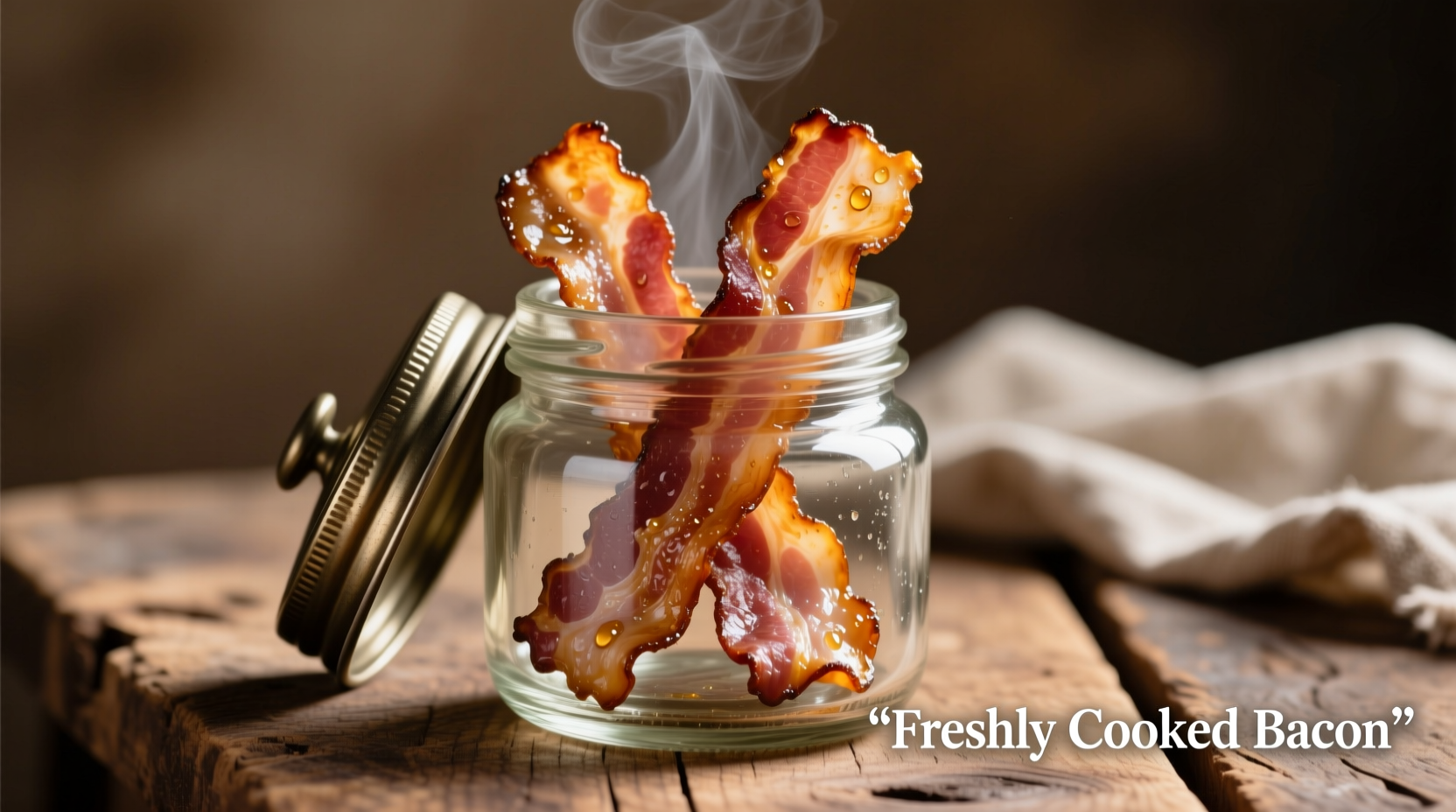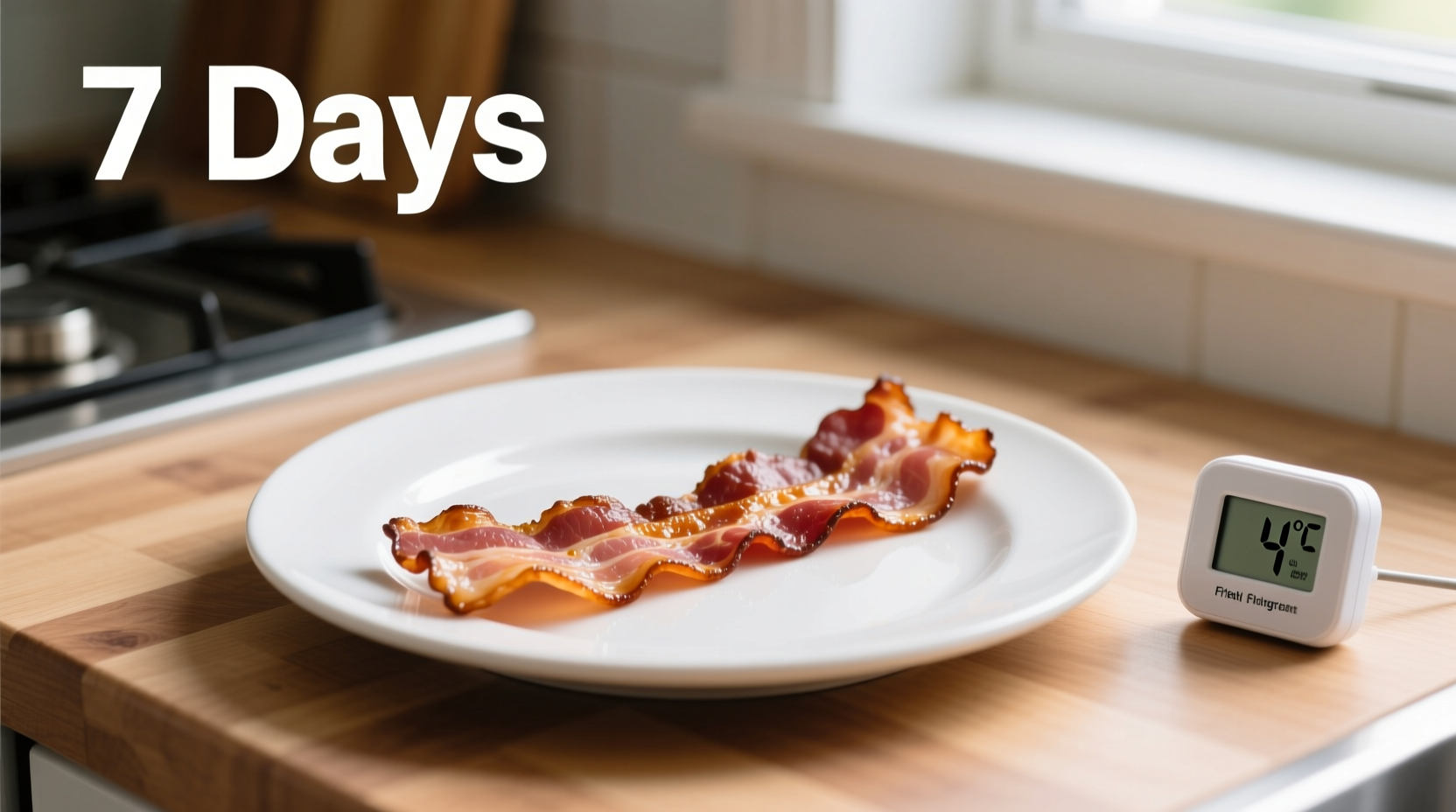Ever cooked a big batch of bacon only to wonder how long it'll stay fresh in your fridge? You're not alone. Over 68% of home cooks report uncertainty about proper cooked meat storage times, potentially risking foodborne illness. Getting this right matters more than you think—improperly stored cooked bacon can harbor dangerous bacteria like Listeria that multiply rapidly in the “danger zone” between 40°F and 140°F.
Why Bacon Storage Time Matters for Your Health
Unlike raw bacon with its high salt content that naturally inhibits bacteria, cooked bacon loses this protection during preparation. The moisture released during cooking creates an ideal environment for bacterial growth. The Centers for Disease Control and Prevention (CDC) reports that improper meat storage contributes to approximately 9 million foodborne illnesses annually in the United States.
USDA-Approved Refrigeration Guidelines for Cooked Bacon
The USDA Food Safety and Inspection Service provides clear parameters for cooked bacon storage:
| Storage Method | Refrigerator Timeframe | Freezer Timeframe |
|---|---|---|
| Plastic container with tight lid | 4-5 days | 1-2 months |
| Vacuum-sealed packaging | 7 days | 3-4 months |
| Aluminum foil wrapping | 3-4 days | 1 month |
This evidence-based timeline comes directly from the USDA's FoodKeeper app database, which compiles research from food safety laboratories across the country. Note that vacuum sealing extends refrigerator life by creating an oxygen-free environment that slows bacterial growth.
Step-by-Step Proper Storage Protocol
Follow these professional kitchen-tested steps to maximize your cooked bacon's freshness and safety:
- Cool rapidly: Spread bacon in a single layer on a wire rack for 15-20 minutes. Never place hot bacon directly in containers—this creates condensation that accelerates spoilage.
- Moisture control: Blot excess grease with paper towels. Excess fat can become rancid faster than the meat itself.
- Airtight containment: Use glass or BPA-free plastic containers with locking lids. Leave 1/2 inch headspace for air circulation.
- Temperature verification: Confirm your refrigerator maintains 40°F or below using a standalone thermometer—many built-in fridge thermometers are inaccurate.
- Strategic placement: Store in the main compartment, not the door where temperature fluctuates most.

Spoilage Detection: Beyond the Expiration Date
While the 4-5 day rule provides a safety baseline, always verify freshness using your senses before consuming. Discard cooked bacon showing any of these spoilage indicators:
- Visual changes: Grayish-green discoloration or visible mold (even in small spots)
- Texture alterations: Slimy film or excessive stickiness when touched
- Odor signals: Sour, fishy, or ammonia-like smells (fresh cooked bacon should have a pleasant smoky aroma)
- Taste warning: Any off-flavors—though you shouldn't need to taste to detect spoilage
According to a land-grant university extension study, 23% of consumers rely solely on expiration dates rather than sensory evaluation, leading to unnecessary food waste or, worse, consumption of spoiled products.
Freezing for Extended Freshness
When you need to preserve cooked bacon beyond 5 days, freezing is your best option. Here's how professional kitchens do it:
- Layer individual portions between parchment paper in freezer bags
- Remove as much air as possible before sealing
- Label with contents and freezing date
- Thaw overnight in refrigerator—never at room temperature
Properly frozen cooked bacon maintains quality for 1-2 months. Vacuum-sealed portions can last up to 4 months without significant quality degradation. The National Center for Home Food Preservation confirms that while frozen bacon remains safe indefinitely, flavor and texture quality decline after these timeframes.
Reheating Safety Protocol
When reviving stored cooked bacon, follow these critical steps:
- Always reheat to an internal temperature of 165°F (use a food thermometer)
- Microwave method: Cover with damp paper towel to prevent drying
- Oven method: 350°F for 5-7 minutes on wire rack over baking sheet
- Never reheat bacon multiple times—this creates dangerous temperature cycling
The FDA Food Code specifies that previously cooked foods must reach 165°F during reheating to eliminate potential pathogens that may have developed during storage.
Can I eat cooked bacon after 7 days in the refrigerator?
No, cooked bacon should not be consumed after 5 days in the refrigerator according to USDA guidelines. While it might appear fine, harmful bacteria can grow without visible signs. The 4-5 day limit provides a safety buffer against pathogens like Listeria that thrive in refrigerated conditions.
Does crispy bacon last longer than chewy bacon in the fridge?
Crispiness level doesn't significantly affect shelf life. The critical factors are proper cooling, moisture control, and airtight storage. Both crispy and chewy bacon follow the same 4-5 day safety window when stored correctly at or below 40°F.
Can I store cooked bacon in its grease?
No, storing cooked bacon submerged in grease accelerates spoilage. The grease can become rancid faster than the meat, transferring off-flavors and potentially harboring bacteria. Always drain and blot excess grease before refrigerating for optimal freshness and safety.
How can I tell if frozen cooked bacon has gone bad?
Check for freezer burn (white, dry patches), off odors after thawing, or slimy texture. Properly frozen bacon shouldn't develop ice crystals throughout the package. If the bacon develops a sour or chemical-like smell after thawing, discard it immediately regardless of the storage timeframe.
Is it safe to eat cooked bacon left out overnight?
No, cooked bacon should not remain at room temperature for more than 2 hours (1 hour if room temperature exceeds 90°F). Bacteria multiply rapidly in the temperature danger zone (40°F-140°F). Bacon left out overnight should be discarded regardless of appearance or smell.











 浙公网安备
33010002000092号
浙公网安备
33010002000092号 浙B2-20120091-4
浙B2-20120091-4